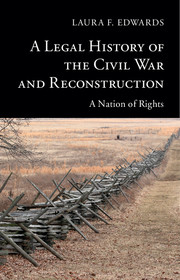Book contents
- Frontmatter
- Dedication
- Contents
- Acknowledgments
- Introduction
- 1 The United States and Its Use of the People
- 2 The Confederacy and Its Legal Contradictions
- 3 Enslaved Americans, Emancipation, and the Future Legal Order
- 4 The Federal Government and the Reconstruction of the Legal Order
- 5 The Possibilities of Rights
- 6 The Power of Law and the Limits of Rights
- Conclusion
- Bibliographic Essay
- Bibliography
- Index
- References
4 - The Federal Government and the Reconstruction of the Legal Order
Published online by Cambridge University Press: 05 February 2015
- Frontmatter
- Dedication
- Contents
- Acknowledgments
- Introduction
- 1 The United States and Its Use of the People
- 2 The Confederacy and Its Legal Contradictions
- 3 Enslaved Americans, Emancipation, and the Future Legal Order
- 4 The Federal Government and the Reconstruction of the Legal Order
- 5 The Possibilities of Rights
- 6 The Power of Law and the Limits of Rights
- Conclusion
- Bibliographic Essay
- Bibliography
- Index
- References
Summary
Tennessee had been exempted from the Emancipation Proclamation, as had parts of the Confederacy occupied by U.S. troops in 1863. Slavery did not end in those states or in slave states that had remained in the Union until they adopted new constitutions that prohibited slavery or the Thirteenth Amendment’s ratification resolved the issue for them. Tennessee approved a new constitution with provisions to end slavery in February 1865, before the Confederacy surrendered. But the end of slavery did not end the problems faced by those who had once been enslaved. With Tennessee’s new constitution, wrote a group of African Americans from the state, we “became formally and legally free, our prayers were answered, and the secret hopes of our hearts were realized.” The problem was that the legislature “failed, as we think, to pass the necessary laws, to recognize our standing, and secure to us by law, our rights as freemen.” They continued, “As we are now the old slave laws of the State remaining unrepealed, and the oath of the colored man not being received by our Courts, as against the whites, we have no where to look for protection, save to the United States Authority.” “In those authorities,” they wrote, “we have the fullest confidence: but we want some way of easily bringing our cases before them.”
Therein lay the problem. The federal government’s jurisdiction did not extend to matters of the kind that plagued this group of African Americans. In fact, the states’ broad authority over the legal status of the American people – the issue that brought the nation to war – remained unchanged, despite everything that had happened between 1860 and 1865. It was not just an issue for African Americans who lived in the former Confederacy. It was an issue all over the United States, where states and localities routinely restricted the rights of African Americans, all women, and a range of other racial, ethnic, and religious minorities as well. That situation, once accepted without comment, appeared increasingly problematic because of the national vision pursued by Republican Party leaders during the Civil War.
- Type
- Chapter
- Information
- A Legal History of the Civil War and ReconstructionA Nation of Rights, pp. 90 - 119Publisher: Cambridge University PressPrint publication year: 2015

